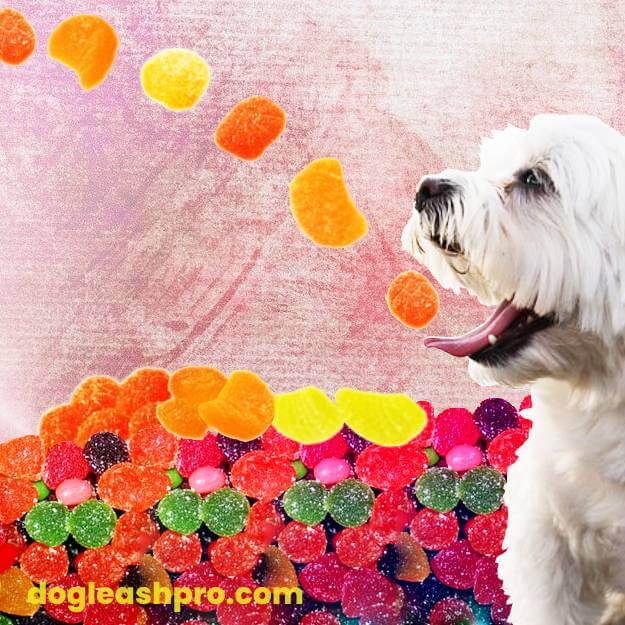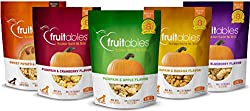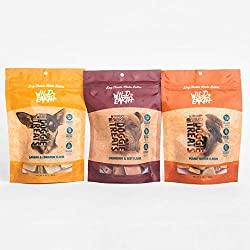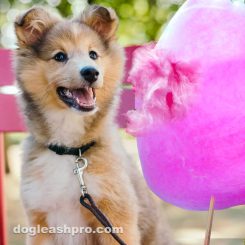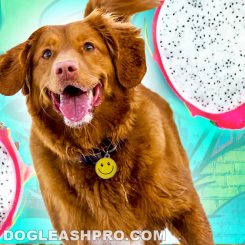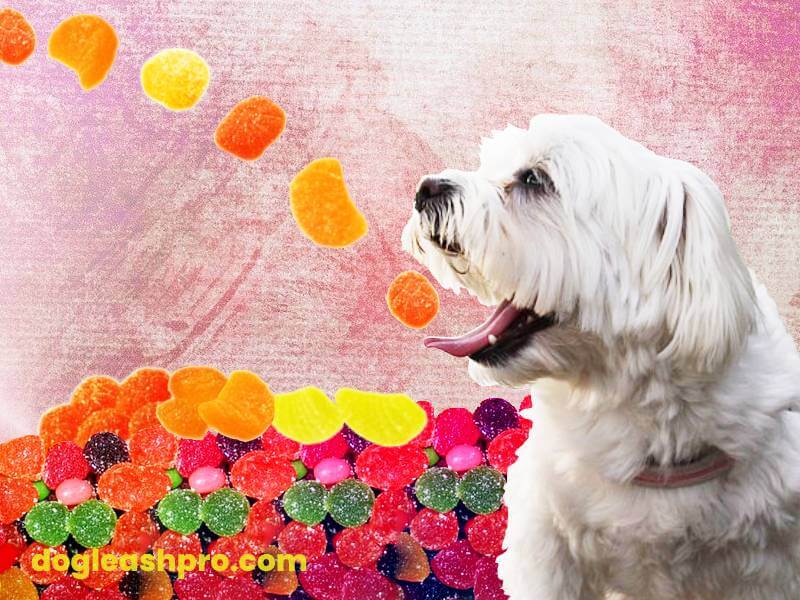
Can dogs eat Fruit snacks? No, dogs should not eat Fruit snacks as these colorful gummy fruits contain tons of sugar and are high in calories. Contrary to the name, they are neither a healthy snack nor fruits. If you must, you can feed them to your dogs in moderation but we recommend that you avoid feeding this sugary candy to your pooch.
My 6-year-old nephew visited me last Saturday and saw my candy jar full of his favorite Fruit snacks. He took one out of the jar and happily ripped it open. My two pups love my little nephew. They sat by his side, sniffing the treat in his hands. Little did I know, my nephew shared his Fruit snacks with my two dogs. I started to worry if Fruit snacks are safe for doggy consumption and it inspired me to write this article.
I explained to my nephew that that was very nice of him, but much like Vanilla Wafers, Fruit snacks are packed full of sugar so it’s not safe or healthy to give dogs this human treat. My nephew politely nodded and said he promised not to feed any more Fruit snacks to our dogs anymore.
Table of Contents
What are fruit snacks?
Fruit snacks are sweet chewy gummy candies that are shaped like little fruits. It is marketed by many manufacturers and companies as snack food to parents with little children.
You’ll see at least three colors: red, orange, and purple gummy fruits. Many food manufacturers use synthetic color dyes to make the gummy candies interesting and appealing to attract children.
If your kids are snacking on Fruit snacks, there’s a high chance that they may be sharing these Fruit snacks with their dog nearby. Unlike adult dog owners, your children may not think twice before sharing these Fruit snacks with your furry family member.
READ ALSO: Can Dogs Eat Jello? Complete Guide to Dogs & Gelatin
What are Fruit snacks made out of?
The short answer is that Fruit Snacks are generally made of sugar. The sugar in the Fruit Snacks is usually from concentrated grape juice, which makes it refined sugar. Dogs should not have grapes in general as grapes are actually toxic to dogs and can cause kidney failure.
In fact, when it comes to Fruit snacks, more than half the weight comes from sugar alone.
Although some Fruit snacks are marketed as being healthier than other gummy candies, they have similar nutritional profile as many gummy candies on the market.
Additionally, there’s actually not much nutritional value or even protein in these Fruit snacks. The fruit snacks are just filled with sugar, fats, water, and starch.
Let’s actually dive in and see what specific ingredients are in typical Fruit snacks.
Ingredients in Fruit snacks
Here are the ingredients in one of the well-known fruit snacks:
Welch’s Fruit Snacks
- Fruit puree (grape, peach, orange, strawberry and raspberry)
- Corn syrup
- Sugar
- Modified corn starch
- Gelatin
- Concord grape juice from concentrate
- Citric acid
- Lactic acid
- Natural and artificial flavors
- Ascorbic acid (vitamin C)
- Alpha tocopherol acetate (vitamin E)
- Vitamin A palmitate
- Sodium citrate
- Coconut oil
- Carnauba wax
- Annatto (color)
- Turmeric (color)
- Red 40
- Blue 1
Let’s compare the ingredients from that Fruit snacks to the ingredients in a typical gummy bear snack:
Haribo Gummi Candy
- Glucose syrup (from wheat or corn)
- Sugar
- Gelatin
- Dextrose (from wheat or corn)
- Contains less than 2% of:
- Citric acid
- Artificial and natural flavors
- Palm oil
- Palm kernel oil
- Carnauba wax
- White beeswax (used as stiffening agents)
- Yellow beeswax (used as stiffening agents)
- Yellow 5
- Red 40
- Blue 1
- May contain: wheat, traces of milk.
As you can see, Welch’s Fruit snacks are basically gummy bears with tons of fruit puree and juice from concentrate. Both of these candies contain sugar, corn syrup or glucose syrup, artificial flavors, preservatives, and synthetic dyes for coloring.
Handy Hint: In order to figure out whether the food in your hand is safe for doggy consumption, consider how much sugar is in it, if it contains preservatives, and whether there are added preservatives. Strawberry Jam has all of these so you’d want to avoid feeding this to your pooch as well.
Let’s go over the ingredients so you’re aware of what you may have potentially fed your pooch:
Fruit puree (Safe in moderation)
Fruit puree is the only healthy ingredient in this fruit snack that is safe for dogs. However, since it is mixed with other harmful and toxic ingredients, the Fruit snacks are no longer safe or healthy for our furry friends.
If your pooch loves fruits, there are natural fruit purees that you can make at home that are far more natural and healthier for your four-legged friends. Opt for natural homemade fruit purees to satisfy your dog’s fruit craving instead of these sugary gummy candies that looks like fruits.
Corn syrup and Glucose syrup (Harmful)
Corn syrup is made from corn while glucose syrup can be made from potatoes and wheat. Both corn syrup and glucose syrup are simply sugar. These sugary ingredients are what make Fruit snacks unsuitable for doggy consumption.
Since corn syrup has a high sugar content, it makes Fruit snacks unhealthy for dogs (even as a treat). While the Fruit snacks may look small, they are loaded with corn syrup and added sugar that your canine friends do not need.
You may also be tempted to brush it off and feed your furry friends Fruit snacks anyways since they are small, but regularly feeding them to your pooch this sugary candy can have negative consequences including putting your pooch at risk for the following:
- Diabetes.
- Weight gain.
- Obesity.
You might also like: Can Dogs Eat Gummy Bears?
Sugar (Harmful in large amount)
Fruit snacks are packed with sugar. Just 1 pouch contains 11g of sugar which is what makes this tiny gummy candy dangerous for our furry friends. While food that contains natural sugar is fine (like fruits), added sugar is harmful to our dog’s health.
Too much sugar consumption can affect your canine’s digestive system because excess sugar intake can disrupt the balance of bacteria that is needed to properly digest food. When this happens, your pup may vomit or have diarrhea.
Here are the symptoms of too much sugar intake:
- Dental issues such as tooth decay and cavities.
- Weight gain.
- Obesity.
- Diabetes such as type 2 diabetes.
- Hormonal imbalances.
When dogs eat food or candy with too much sugar, it affects their body and health. Here’s what can happen to their bodies:
- Inflammation throughout the body.
- Dermatitis.
- Arthritis.
- Pancreatitis.
- Dental disease.
- Lethargy.
Make sure your canine companions stay away from Fruit snacks.
Fun Fact: Whipped cream also contains tons of sugar and fat. In fact, some Whipped cream uses sugar substitutes like corn syrup or high fructose corn syrup to make it very sweet and tasty. If your Whipped cream contains these ingredients, it’s best to keep this away from your furry friends.
Gelatin (Safe on its own)
Gelatin is fine for dogs to ingest since it contains pure protein, but when it’s mixed or added with tons of other harmful ingredients, then it is no longer safe for dogs to eat. Due to this reason, you should avoid feeding your pooch Fruit snacks.
Citric acid (Harmful)
Citric acid does not sit well with the dog’s taste buds or stomach. Eating food with large quantities of citric acid can cause an upset stomach in dogs and may even affect their central nervous system.
Artificial flavors (Harmful)
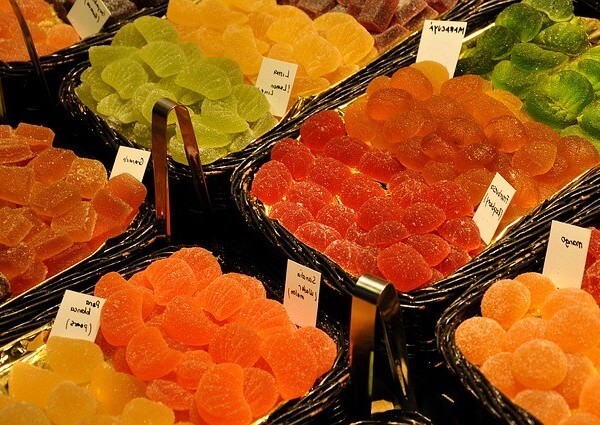
It’s best to keep artificial flavors away from our canine friends. As the term suggests, artificial flavors are not natural flavors. They are flavor additives that were prepared by flavor chemists or flavorists to mimic the taste of natural flavors and ingredients.
While artificial flavors are used to make food taste, look, and smell tasty, it is actually very dangerous for dogs. Some artificial flavors are made by combining chemicals made from ingredients such as petroleum. This information is enough to scare me and keep me from feeding my pooch Fruit snacks.
Sodium citrate
Sodium citrate is usually an ingredient in canine medications. It is used as a lubricant or fecal softener. It is also used to help respiration in dogs when they are under anesthesia. Only a small dose is necessary. Based on this information alone, it is not an ingredient that I would want my furry friends to consume.
Carnauba wax (Safe in small amount)
While carnauba wax is not entirely toxic to dogs, ingesting too much carnauba wax can be problematic for dogs. It is much better to use organic carnauba wax for doggy consumption.
Fun Fact: Reese’s Pieces is another candy that also contains carnauba wax, artificial flavors, and artificial colors. Think twice before you give this candy to your four-legged friends.
Annatto (color) and Turmeric (color)
Annatto is a vegetable dye that is used to substitute artificial orange dyes. It is also used to color the yellow cheese balls and can cause seizures in dogs.
Color dye no matter if it is annatto or turmeric is not safe for dogs. Avoid feeding your pups Fruit snacks for this reason as well.
Red 40 (Harmful and dangerous)
Red 40 is an artificial dye that adds the color red to the food. Red 40 is popularly used in many pet foods. It is well known due to its bad reputation. This artificial food coloring contains tons of cancer-causing contaminants since it is made from petroleum and bugs.
In humans, it has proven to cause cancer and a list of behavioral issues. In children, Red 40 has been linked to hyperactivity, hypersensitivity reactions, and ADHD. Studies have also shown that Red 40 may increase the rate and appearance of tumors in the immune system of mice.
If this can happen to humans and mice, think about what it is doing to our furry friends when we feed them food containing artificial dyes. Red 40 is unnecessary in dog food. With that said, you should avoid feeding your furry friends food with coloring additives.
The Food and Agriculture Organization and World Health Organization states that the acceptable daily intake of Red 40 should be 3.2 mg per pound of body weight. This means an average dog that weighs 70 pounds can safely consume 224 mg of Red 40.
Regardless, we still advised that you avoid feeding your pooch food that contains Red 40, including Fruit snacks.
Blue 1 (Harmful)
Blue 1 is another artificial food dye. It is a synthetic dye that adds the color blue to processed foods. Unfortunately, Blue 1 is made from coal tar. While it is approved by both the U.S. Food and Drug Administration and European Food Safety Authority, it can cause allergic reactions in humans.
There have been studies that Blue 1 may cause cancer in animals. It also does not provide any nutritional benefits and does more harm than good. For example, Blue 1 can cause your brain to turn blue since it can cross the blood vein barrier in your brain. In mice, it has shown to affect reproduction, and cancer cells.
Since Blue 1 is unfit for human consumption, it is best to avoid feeding Fruit snacks to your pooch.
Fun Fact: Your canine companion may love the crunchy factor of the Fortune Cookies however they do contain many ingredients that may not be safe for dogs, including sugar, vanilla extract, salt, and flour.
Are Fruit snacks bad for dogs?
Based on the ingredients listed above, yes, Fruit snacks are bad for dogs. A responsible pet owner would avoid feeding Fruit snacks to their pooch. The amount of sugar is detrimental to your dog’s health.
On top of the unnecessary amount of sugar that’s in Fruit snacks, this sugary candy is also high in calories. Let’s take Welch’s Fruit Snacks as an example.
Nutritional Profile of Welch’s Fruit Snacks (1 pouch or 26g)
| Name, Unit | Amount |
| Calories, cal | 80 |
| Total Carbohydrate, g | 20 |
| Total Sugars, g | 11 |
| Sodium, mg | 10 |
When it comes to daily food intake, a dog should only consume about 25 calories for every pound they weigh. If we have a small and a medium dog, this means that:
- A 10-pound Chihuahua dog should only consume a maximum of 250 calories per day.
- A 70-pound Labrador dog should only consume a maximum of 1,750 calories per day.
A Chihuahua that accidentally eats a pouch or 26g of Fruit snacks would receive 80 calories of her daily 250 calories from these Fruit snacks alone. These 80 calories contain no nutritional value, have a small amount of fat, and are full of sugar.
While there are vitamins A and C from Welch’s Fruit snacks, your pooch can easily get this from his or her regular dog food or other healthier canine-friendly snack alternatives.
So, will Fruit Snacks hurt dogs?
Yes, Fruit Snacks can and will hurt your dogs. While this gummy candy may not be toxic to dogs, they do contain a lot of ingredients that are unhealthy and unsafe for doggy consumption. Here are some reasons why sharing your Fruit Snack candy with your four-legged friends is a bad idea:
1. Fruit Snacks contain high sugar level that is bad for dogs
Too much sugar intake is bad for our furry friend’s health. Fruit Snacks contain refined sugar. When our K9 pals consume a lot of sugar, it can cause diabetes, obesity, dental issues, and even pancreatitis.
2. Fruit Snacks can cause upset stomach in dogs
Aside from the health issues above, feeding your dog Fruit Snacks may result in vomiting and diarrhea.
3. The high sugar content in Fruit Snacks can lead to metabolism changes in dogs
Fruit Snacks can increase your dog’s insulin production. Too much insulin might cause obesity and cause your pooch to be less active. Obese dogs have lower energy level and they are prone to heart diseases.
4. Fruit Snacks contain concentrated grape juice which is toxic to dogs
Fruit Snacks contain concentrated grape juice which is dangerous to dogs. It is important to note that grape juice, no matter what form – whether it is fruit concentrate or whole fruit juice – should not be given to our furry friends. That’s because grapes contain a toxin that can cause liver and kidney failure in dogs.
5. Feeding your dogs Fruit Snacks may lead to urinary stones in dogs
Dogs produce Vitamin C on their own. Feeding them Fruit Snacks may do more harm than good since too much Vitamin C can cause urinary stones in dogs.
If you want to feed your furry friends fruits, stick to fresh and organic ones. However, make sure the fruit is canine-friendly.
Dogs and Fruit Snacks
Can dogs eat gummy Fruit Snacks?
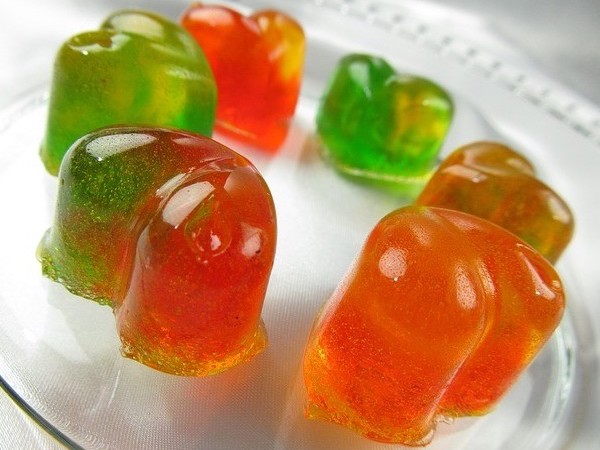
No, dogs should not eat gummy Fruit snacks. Gummy Fruit snacks are essentially gummy bear candies. Many manufacturers will try to market gummy Fruit snacks as healthy snacks by adding a little bit of concentrated grape juice or fruit puree to convince parents that these Fruit snacks are healthy for their children.
In reality, Fruit snacks are gummy candies and they are mostly high in sugar and calories. They also do not contain any nutritional benefits.
Although Welch’s Fruit snacks have Vitamin A and C, they come from ascorbic acid and tocopheryl acetate. It’s best if your canine friends get their vitamins and minerals from regular dog food or healthy dog treats.
Can dogs eat Welch’s Fruit Snacks?
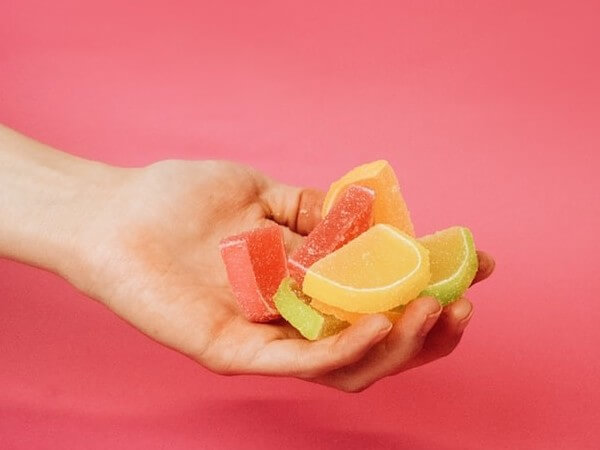
No, dogs should not eat Welch’s Fruit Snacks. They are not healthy and contain tons of sugar, fat, and concentrated juice. Fruit snacks are also high in calories with little to no nutritional benefits to your pooch.
Can dogs eat Motts Fruit Snacks?
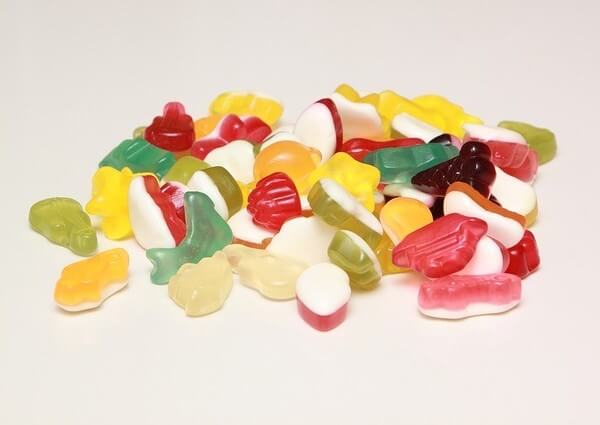
No, dogs should not have Motts Fruit Snacks. If we take a look at the ingredients, we can already see that this Fruit Snack is full of sugar. The high sugar content in Fruit Snacks comes from sugar and corn syrup.
Additionally, the Fruit Snack contains juice concentrate which is not healthy for dogs. The pear, apple, and sweet potato juice are from concentrate.
Then there’s citric acid which isn’t good for our dog’s tummy.
If dogs accidentally ate 1 pouch of the Motts Fruit Snacks or 0.8 oz, they will have consumed 19 grams of carbs, 10 grams of sugar, 30 mg of sodium. This is way too many carbs, sugar, and sodium for our furry friends when it comes to treats.
Keep in mind that doggy treats should only be 10% of your pup’s daily calories. In just 1 pouch or 0.8 oz of Motts Fruit Snacks, there are 80 calories. If you have a small dog, this can go over their calorie intake.
Regularly eating Motts Fruit snacks can cause weight gain or obesity, diabetes, dental issues, metabolism changes, and even pancreatitis. For these reasons, it’s best that our four-legged friends stay away from Motts Fruit Snacks.
When shouldn’t you feed Fruit snacks to your dog?
Avoid feeding your dog Fruit snacks if he is currently diabetic, overweight, or has the following health issues:
- Heart problem.
- Pancreatitis.
- Arthritis.
- Dental issues such as tooth decay.
Dog-friendly, safe, and non-toxic Fruit snacks alternatives
If your furry family member love fruits and vegetables, here are some options they should have instead of the Fruit snacks:
- Blueberries are rich in antioxidants. They are considered a superfood and can help to protect from cell damage in canines. Blueberries are packed with phytochemicals and fiber and will satisfy your dog’s sweet tooth.
- Apples. If you’re looking for Vitamins A and C, apples are the solution, not Fruit snacks. Apples are sweet and contain fiber which will help your canine’s digestive system function properly. Before you feed apples to your pups, make sure to remove the seeds and the core to prevent choking.
- Carrots are also high in fiber and vitamins. The carrots are also great for your dog’s teeth as the carrot pieces can get rid of the tartar in their teeth. Instead of the Fruit snacks ruining your puppy’s teeth, the carrots actually help their teeth.
- Pineapples are sweet and are packed full of fiber, minerals, and vitamins. The sweetness from this fruit will also satisfy your puppy’s sweet tooth. Pineapples also contain an enzyme called bromelain. Bromelain helps dogs absorb proteins easier.
Are Fruit snacks candy?
As if the above information isn’t scary enough, in late 2015, there was a class-action lawsuit filed against Promotion in Motion, the manufacturer of Welch’s Fruit Snacks.
The lawsuit condemned the manufacturer for using marketing tactics to deceive customers into thinking their Fruit snacks are healthy, fruity, and delicious when in fact this candy is dangerous and harmful.
What happens if a dog accidentally eats a Fruit Snack?
A Fruit Snack is a form of gummy candy made with the flavors of fruit. Candies are generally bad for dogs because they are filled with so much sugar and preservatives and have little nutritional value.
If your dogs accidentally eat a Fruit Snack, do not panic. You’ll want to assess how much of this candy they have ingested. If only a little amount was consumed, then your furry friend will most likely pass it out the next time he goes potty.
However, observe your dog’s condition for a couple of days. If they worsen, call your pup’s vet as soon as you can. Your vet may ask you to bring your pooch in for a thorough examination.
Fruit Snacks are not entirely a toxic food for dogs. However, if you give your pooch Fruit Snack quite often, here are some of the potential health conditions your dog may suffer from:
- Obesity
A lot of sugar intake can cause canine obesity. Some of the common signs of obesity are the unnatural roundness of the body, lethargy, refusing to exercise, tiredness, excessing panting, and abdominal sagging.
- Diabetes
Diabetes is caused by your dog’s body not producing enough insulin or that the pancreas produces enough, but the body is not using it as it should. The most common symptom of diabetes is excessive water drinking and urination, weight loss, and cloudy eyes.
Check out: How To Soften Dog Eye Boogers?
- Dental problems
Your dogs can also develop dental problems when they eat too many sweets regularly. Our furry friends are prone to periodontal disease, especially when they have already been suffering from diabetes. The most common symptoms include bleeding of the gums, bad breath, and loss of teeth.
So, can dogs eat Fruit snacks?
Based on the information listed above, Fruit snacks do not make for great dog treats. They are packed with all the ingredients that are harmful to your dog’s health, namely sugar, fat, concentrated grape juice, synthetic dyes for color, citric acid, and artificial flavors.
Here is a good rule of thumb: If you come across a food item and don’t understand what some of the ingredients are or can’t pronounce them, then it’s best to skip it. And Fruit snacks are gummy fruit candies that you should skip. For a healthy and happy dog, avoid feeding him or her these Fruit snacks.
DISCLAIMER: THIS WEBSITE DOES NOT PROVIDE MEDICAL ADVICE
The information, including but not limited to, text, graphics, images and other material contained on this website are for informational purposes only. No material on this site is intended to be a substitute for professional veterinary advice, diagnosis, or treatment. Always seek the advice of your veterinarian or other qualified health care provider with any questions you may have regarding dietary needs.
Resources:
https://en.wikipedia.org/wiki/Fruit_snack
https://en.wikipedia.org/wiki/Welch%27s

With over five years of specialized experience as an animal writer, my expertise lies in dog nutrition, health, behavior, grooming, and training. I am dedicated to delivering helpful and informative content that caters to the well-being of our furry friends. My primary goal is to empower pet owners with knowledge and ensure our canine companions thrive in health and happiness. In my free time, I love volunteering at local dog rescue centers.
